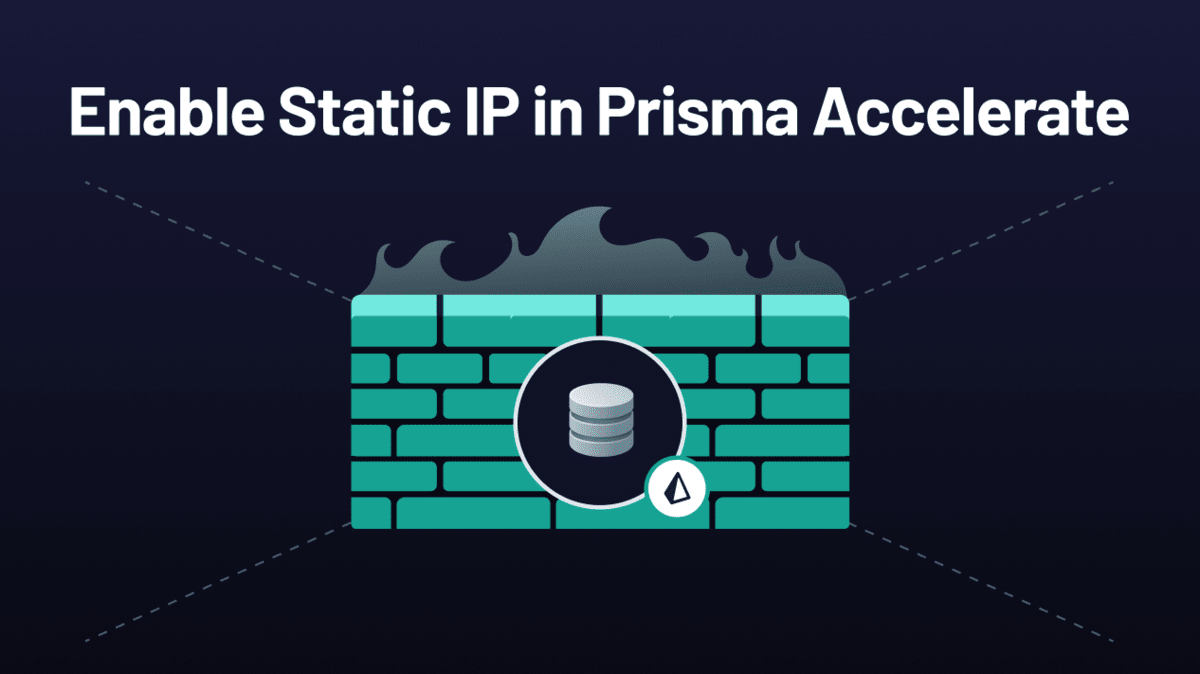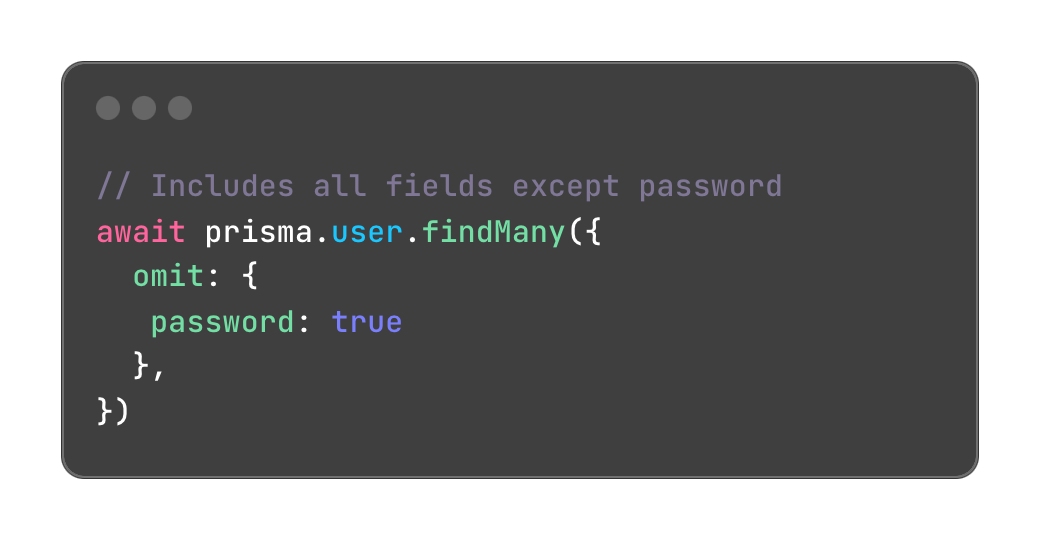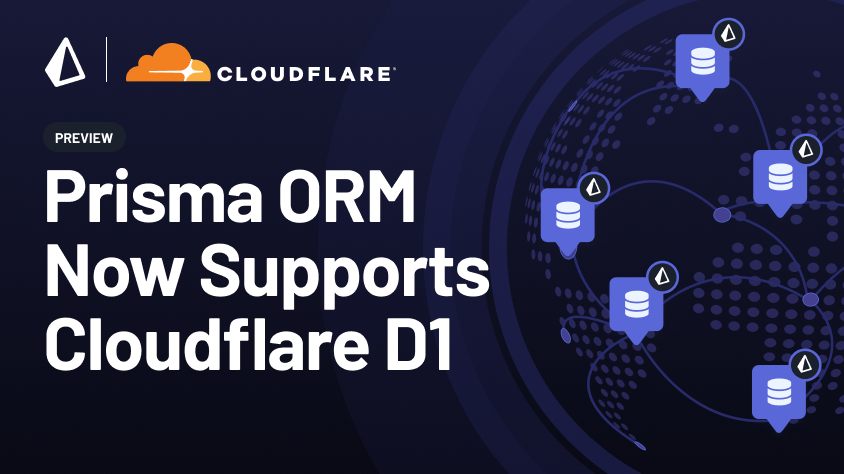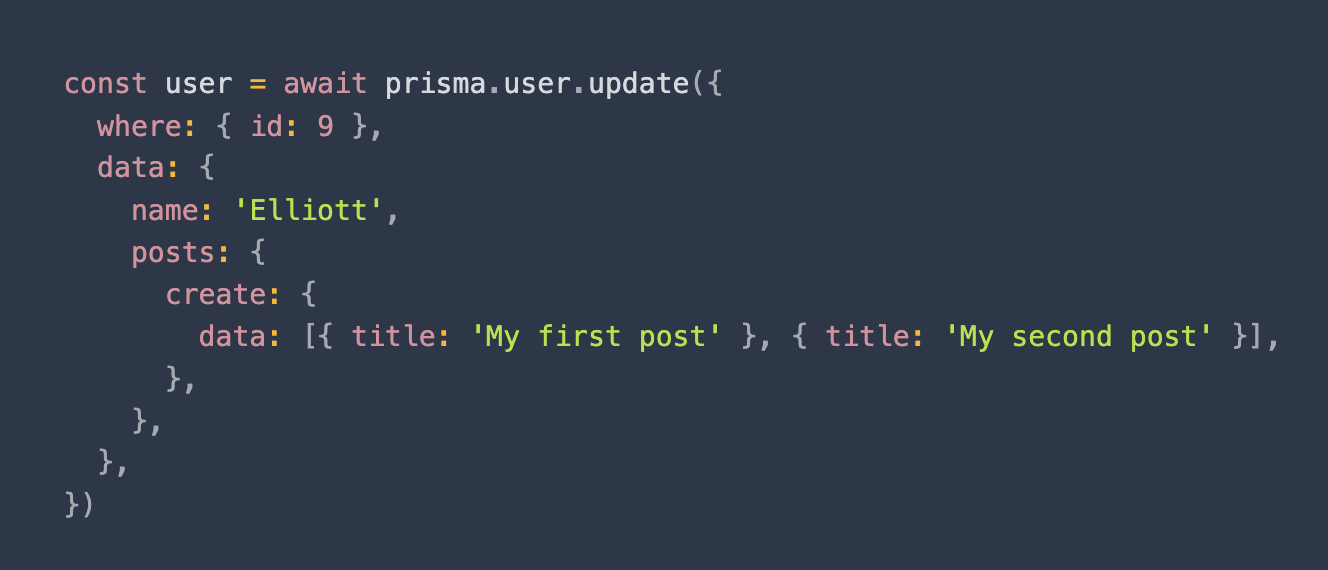Introducing Static IP Support in Prisma Accelerate
Prisma Accelerate introduces Static IP support, enabling secure connections to your database with predictable IPs for controlled access and minimized exposure. This allows connections from Accelerate to databases requiring trusted IP access.

Learn more in our blog post, and try it out.
omit Fields From Prisma Client Queries (In Preview)
We’re excited to announce Preview support for the omit option within the Prisma Client query options. The highly-requested omit feature now allows you to exclude fields that you don’t want to retrieve from the database on a per-query basis.
Here is an example of using omit:

Many users have requested a global implementation of omit. This request will be accommodated in the future. In the meantime, you can follow the issue here.
Read more in our latest release notes
Doc Updates
The same docs that you know and love, but now built with Docusaurus! 🦖
👉 Enjoy an improved dark/light mode, search, layout, and Kapa AI experience.
Visit our Docs or peek under the hood at https://github.com/prisma/docs
Introducing Cloudflare D1 (Preview)
Exciting news! 5.12.0 release brings Preview support for Cloudflare D1 with Prisma ORM 🥳

D1 is Cloudflare's native serverless database and was initially launched in 2022. It's based on SQLite and can be used when deploying applications with Cloudflare. Cloudflare has recently announced launching D1 in GA and we couldn't be happier to be adding support and working with them on this new milestone.
Read more in our latest blog post.
Implementing createMany() for SQLite
Bringing support for createMany() in SQLite has been a long-awaited and highly requested feature ⭐
createMany() is a method on Prisma Client, released back in version 2.16.0, that lets you insert multiple records into your database at once. This can be really useful when seeding your database or inserting bulk data.
Read more in our latest release notes.
Platform Console Updates
We have refined our subscription management for a better UX experience.
Here are some cool new additions and improvements:
• We've added support for more payment methods and you can now manage your Tax Ids
• You can now see your invoice history and download past invoices.
Try it out at console.prisma.io

📚 Documentation
• Improved our getting started docs for Prisma Pulse and Railway
• Improved our troubleshooting guide for Prisma Accelerate, so you can more easily resolve common issues you might run into.
Stay in the Loop 🔍
• We’ll be at Epic Web Conference on April 11th, find us if you’re there!
• Plus, you can now follow our updates on our brand new WhatsApp channel. Join and get the Changelog news delivered straight to you.
Pulse in General Availability
We're thrilled to announce that Pulse has reached General Availability! This marks a significant milestone in our journey to redefine how developers interact with database-event driven compute.
Pulse is managed database-event infrastructure that simplifies database-event driven compute, making it easy to power real-time functionality, like chat, notifications, data broadcast, and more.
Pricing? Start for free with our usage-based pricing, designed to scale flexibly with your project.
👉 Check out our announcement blog post and documentation to learn more and get started.

Introducing Platform Environments
Platform Environments is a new feature of the Prisma Data Platform that lets users create different setups within one project. This helps smoothen out the app development process, from testing to going live.
Also, now you can access the Prisma Data Platform using the Prisma CLI, making it easier to manage your resources and workflow (currently in Early Access).
👉 Learn more in our blog post, and take it for a spin.
Prisma ORM Edge Functions Support in Preview
Prisma ORM now supports edge functions, allowing developers to access their databases using Prisma ORM from platforms such as Vercel Edge Functions, Vercel Edge Middleware, Cloudflare Workers, and Cloudflare Pages.
Edge functions improve app performance by reducing request latency and improving response times.

With the release of Prisma v5.11.0, developers can now use Prisma ORM with their favorite Node.js database drivers in edge functions, and the query engine's size has been reduced to fit the limited runtime environment.
If you want to understand what this exciting functionality brings as a whole, take a look at our blog post and go try it.
👉 Share your feedback with us via Twitter or Discord
Performance improvements in nested create operations
With Prisma ORM, you can create multiple new records in nested queries, for example:

In previous versions, Prisma ORM would translate this into multiple SQL INSERT queries, each requiring its own roundtrip to the database. As of this release, these nested create queries are optimized and the INSERT queries are sent to the database in bulk in a single roundtrip.
👉 Read more in our 5.11.0 release notes.
Join the Prisma Partner Network
At Prisma, we deeply value the talented creators, educators, and builders in our community and we’ve long wanted to reward their contributions.
We’re excited to launch the Prisma Partner Network with tailored opportunities for affiliates, tech partners, and resellers.
Made with Prisma
In our real-world interview series, we talk with founders who developed OSS projects using Prisma. Explore our recent chats:
🎥 Umami - The open source Google Analytics alternative
Did you ever feel that Google Analytics is too bloated and that its UI and workflows are too complex? Discover how Umami offers a simple yet powerful alternative analytics tool.
🎥 Dub.co: Aiming for a billion with Prisma
Steven Tey shares his journey from leaving Vercel to launching his startup. Learn how Dub.co began as a passion project, its technology stack, and an in-depth look at its codebase.
